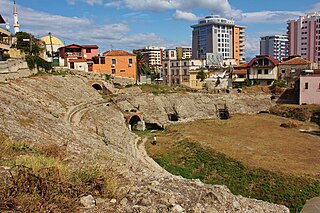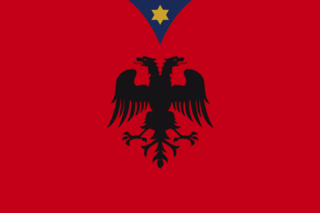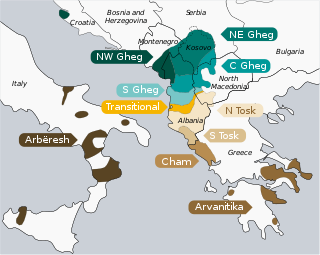Related Research Articles

Messapic is an extinct Indo-European Paleo-Balkanic language of the southeastern Italian Peninsula, once spoken in Salento by the Iapygian peoples of the region: the Calabri and Salentini, the Peucetians and the Daunians. Messapic was the pre-Roman, non-Italic language of Apulia. It has been preserved in about 600 inscriptions written in an alphabet derived from a Western Greek model and dating from the mid-6th to at least the 2nd century BC, when it went extinct following the Roman conquest of the region.

The city of Epidamnos, later the Roman Dyrrachium, was founded in 627 BC in Illyria by Greeks from Corinth and Corcyra.
The ruki sound law, also known as the ruki rule or iurk rule, is a historical sound change that took place in the satem branches of the Indo-European language family, namely in Balto-Slavic, Armenian, and Indo-Iranian. According to this sound law, an original *s changed to *š after the consonants *r, *k, *g, *gʰ and the semi-vowels *w (*u̯) and *y (*i̯), as well as the syllabic allophones *r̥, *i, and *u:

The origin of the Albanians has been the subject of historical, linguistic, archaeological and genetic studies. The first mention of the ethnonym Albanoi occurred in the 2nd century AD by Ptolemy describing an Illyrian tribe who lived around present-day central Albania. The first certain attestation of medieval Albanians as an ethnic group is in the 11th century, when they continuously appear in Byzantine sources.

Prende or Premte is the goddess of dawn, love, beauty, fertility, health and protector of women, in the Albanian pagan mythology. She is also called Afër-dita, an Albanian phrase meaning "near day", "the day is near", or "dawn", in association with the cult of the planet Venus, the morning and evening star. Her sacred day is Friday, named in Albanian after her: e premte, premtja. In Albanian mythology Prende appears as the daughter of Zojz, the Albanian sky and lightning god.
Perëndi is an Albanian noun for God, deity, sky and heaven. It is used capitalized to refer to the Supreme Being, and uncapitalized for "deity", "sky" and "heaven".
Proto-Albanian is the ancestral reconstructed language of Albanian, before the Gheg–Tosk dialectal diversification. Albanoid and other Paleo-Balkan languages had their formative core in the Balkans after the Indo-European migrations in the region. Whether descendants or sister languages of what was called Illyrian by classical sources, Albanian and Messapic, on the basis of shared features and innovations, are grouped together in a common branch in the current phylogenetic classification of the Indo-European language family. The precursor of Albanian can be considered a completely formed independent IE language since at least the first millennium BCE, with the beginning of the early Proto-Albanian phase.

Albanian folk beliefs and mythological stories comprise the beliefs expressed in the customs, rituals, myths, legends and tales of the Albanian people. The elements of Albanian mythology are of ancient Paleo-Balkanic origin and almost all of them are pagan. Albanian folklore evolved over the centuries in a relatively isolated tribal culture and society. Albanian folk tales and legends have been orally transmitted down the generations and are still very much alive in the mountainous regions of Albania, Kosovo, western North Macedonia, Montenegro and South Serbia and among the Arbëreshë in Italy and the Arvanites in Greece.

Eqrem Çabej was an Albanian historical linguist and scholar who, through the publication of numerous studies gained a reputation as a key expert in research on Albanian language, literature, ethnology and linguistics.
The Indo-European Etymological Dictionary is a research project of the Department of Comparative Indo-European Linguistics at Leiden University, initiated in 1991 by Peter Schrijver and others. It is financially supported by the Faculty of Humanities and Centre for Linguistics of Leiden University, Brill Publishers, and the Netherlands Organisation for Scientific Research.

Albanian is an Indo-European language and the only surviving representative of the Albanoid branch, which belongs to the Paleo-Balkan group. Standard Albanian is the official language of Albania and Kosovo, and a co-official language in North Macedonia and Montenegro, as well as a recognized minority language of Italy, Croatia, Romania and Serbia. It is also spoken in Greece and by the Albanian diaspora, which is generally concentrated in the Americas, Europe and Oceania. Albanian is estimated to have as many as 7.5 million native speakers.
Bardhyl or Bardhul is an Albanian masculine given name meaning 'the white/bright one', also reflected from the Illyrian name Bardylis and Messapic Barzidihi and Barduli. The same root is found in the Albanian given name Bardh-i (masculine) and Bardh-a (feminine), as well as in the Albanian surname Bardhi, meaning 'the white one'.

Martin Camaj was an Albanian folklorist, linguist, poet, and writer. He is regarded as one of the major authors of modern Albanian prose. His novel Rrathë is considered to be the first psychological novel written in Albanian.
Selman Riza (1909–1988) was an Albanian linguist and Albanologist. Riza was one of the founding members of the Albanological Institute of Pristina in 1953.
Gustav Meyer was a German linguist and Indo-European scholar, considered to be one of the most important Albanologists of his time, most importantly by proving that the Albanian language belongs to the Indo-European family.

Shaban Demiraj was an Albanian albanologist, linguist, professor at the University of Tirana from 1972–1990, and chairman of the Academy of Sciences of Albania during the period of 1993–1997.

Zojz is a sky and lightning god in Albanian pagan mythology. Regarded as the chief god and the highest of all gods, traces of his worship survived in northern Albania until the early 20th century, and in some forms still continue today.
Albanoid or Albanic is a branch or subfamily of the Indo-European (IE) languages, of which Albanian language varieties are the only surviving representatives. In current classifications of the IE language family, Albanian is grouped in the same IE branch with Messapic, an ancient extinct language of Balkan provenance that is preserved in about six hundred inscriptions from Iron Age Apulia. This IE subfamily is alternatively referred to as Illyric, Illyrian complex, Western Paleo-Balkan, or Adriatic Indo-European. Concerning "Illyrian" of classical antiquity, it is not clear whether the scantly documented evidence actually represents one language and not material from several languages, but if "Illyrian" is defined as the ancient precursor of Albanian or the sibling of Proto-Albanian it is automatically included in this IE branch. Albanoid is also used to explain Albanian-like pre-Romance features found in Eastern Romance languages.

Wilfried Fiedler was a German albanologist, balkanologist, and linguist, known for his significant contributions to the studies of the Albanian language and Balkanology.
References
- 1 2 3 Elsie, Robert (2003). Historical Dictionary of Albania. Rowman & Littlefield. p. 102. ISBN 978-0-8108-6188-6.
- 1 2 "Prof. Dr. Bardhyl Demiraj – Vita". Ludwig-Maximilians-Universität München (in German). Retrieved 2020-03-28.
- ↑ Demiraj, B.; Esposito, A. (2006), "Albanian", in Brown, Keith (ed.), Encyclopedia of Language & Linguistics (Second Edition), Elsevier, p. 155, ISBN 978-0-08-044854-1 , retrieved 2020-03-28